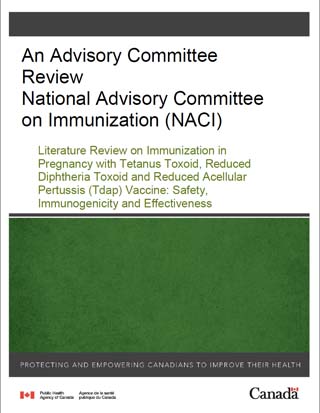Executive summary: Literature review - Update on immunization in pregnancy with Tdap vaccine

Download the alternative format
(PDF format, 888 KB, 116 pages)
Organization: Public Health Agency of Canada
Published: 2018-02-28
Related Topics
Executive summary
Pertussis is an endemic and cyclical disease in Canada that disproportionally affects infants less than 1 year of age. Lack of maternal immunity is assumed to increase an infant's susceptibility to infection, both by increasing the risk of disease in mothers (and subsequent transmission to the infant) and by not providing sufficient passive protection through antibody transfer (via the placenta or via breast milk).
Since the last National Advisory Committee on Immunization (NACI) recommendations were published in 2014, new evidence on the safety and effectiveness of Tdap administration in pregnancy has become available. To provide an update to NACI on the effects of immunization in pregnancy with Tdap, a search strategy was developed with a federal Reference Librarian (Health Library) and verified by the NACI Diphtheria/Tetanus/ Pertussis/Polio/Haemophilus Influenza B Working Group. The objective of the literature review was to provide further evidence for the development of guidance on maternal immunization in pregnancy as a strategy to reduce disease incidence and severe outcomes (defined as hospitalization or death) from pertussis infection in infants younger than 12 months of age.
A query of three databases (OvidMEDLINE, Embase, Cochrane Library) on November 28, 2016 (updated July 25, 2017) identified 59 relevant studies on immunogenicity, safety and effectiveness that were rated for quality and included for evidence synthesis. The type of evidence retrieved on this topic was diverse, including randomized controlled trials, cohort studies, and case-control studies, with the quality of evidence that ranged from good to poor.
In the majority of reviewed studies, post immunization increases in antibody levels resulted in more than 90% of women achieving anti-PT levels ≥greater than or equal to10 IU/ml at one month following immunization. While no serologic correlate of clinical protection against pertussis currently exists, anti-PT levels greater than or equal to 10 IU/ml are considered to be protective against severe disease. In infants, maternal immunization was found to result in increased pertussis antibody concentrations, with avidity increasing linearly with time up to delivery. In the majority of studies, following the receipt of the fourth DTaP dose after 15 months of age, no statistically significant differences in antibody levels and avidity were observed between infants whose mothers received Tdap in pregnancy and those whose mothers did not receive Tdap in pregnancy. No major maternal or infant safety issues, including pregnancy outcomes, were reported in the reviewed literature.
Effectiveness of maternal Tdap immunization in pregnancy was estimated to be over 90% against pertussis in infants younger than 2 two months of age, with no deaths observed among infants whose mothers received Tdap prior to 36 weeks of pregnancy. Maternal immunization with Tdap in pregnancy likewise resulted in a reduction in infant disease severity and hospitalization. Vaccine effectiveness was also reported to persist after the receipt of the first three DTaP doses in infants, with immunization in pregnancy resulting in an additional reduction in riskof up to 70% in children whose mothers received Tdap in pregnancy. Many effectiveness studies did not specify which gestational week during pregnancy Tdap vaccine was provided, but the majority of studies included immunization during the late second and early third trimester.
Overall, the review of literature on Tdap administration in pregnancy provided good evidence that routine immunization programs are a safe and effective way to protect infants less than one year of age from severe outcomes of pertussis infection.
The literature review is available through the Government of Canada Publications website. To obtain the report in an alternative format, please contact us by email: phac.naci-ccni.aspc@canada.ca